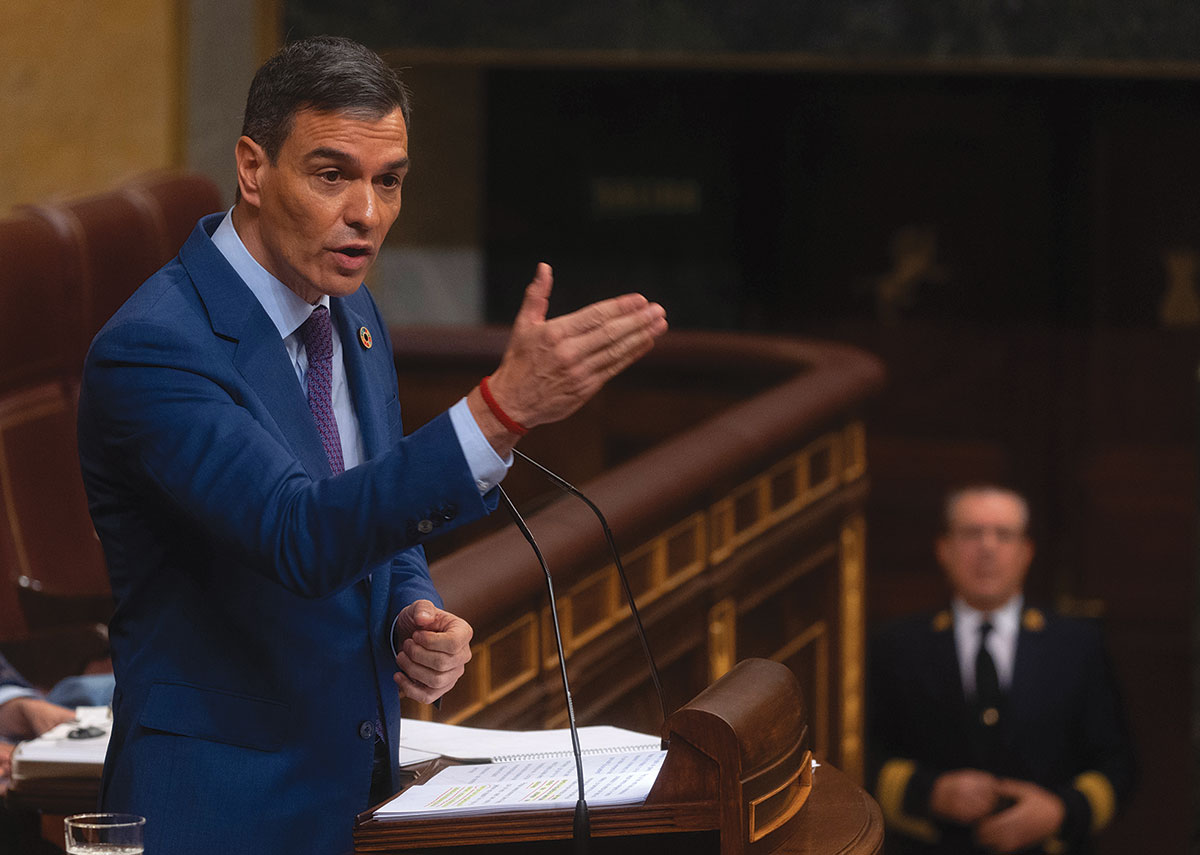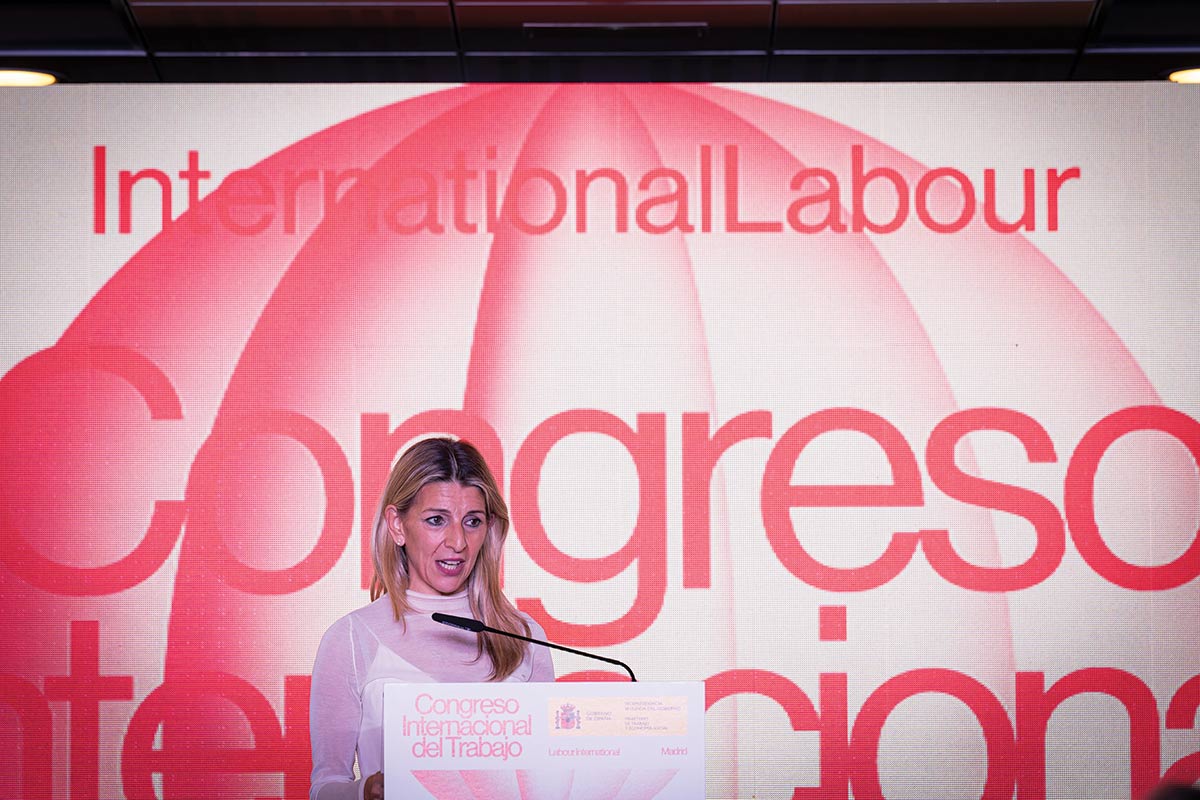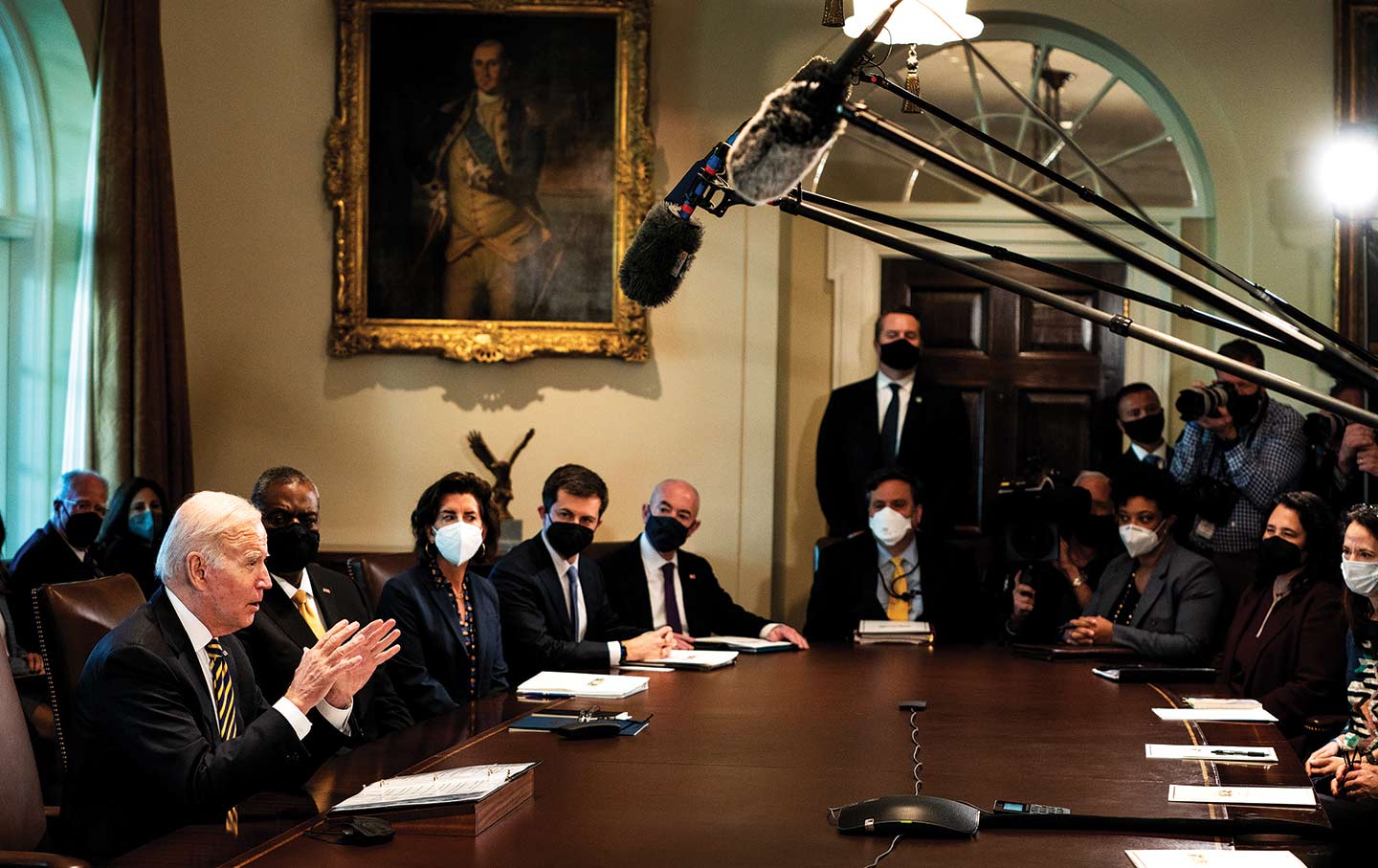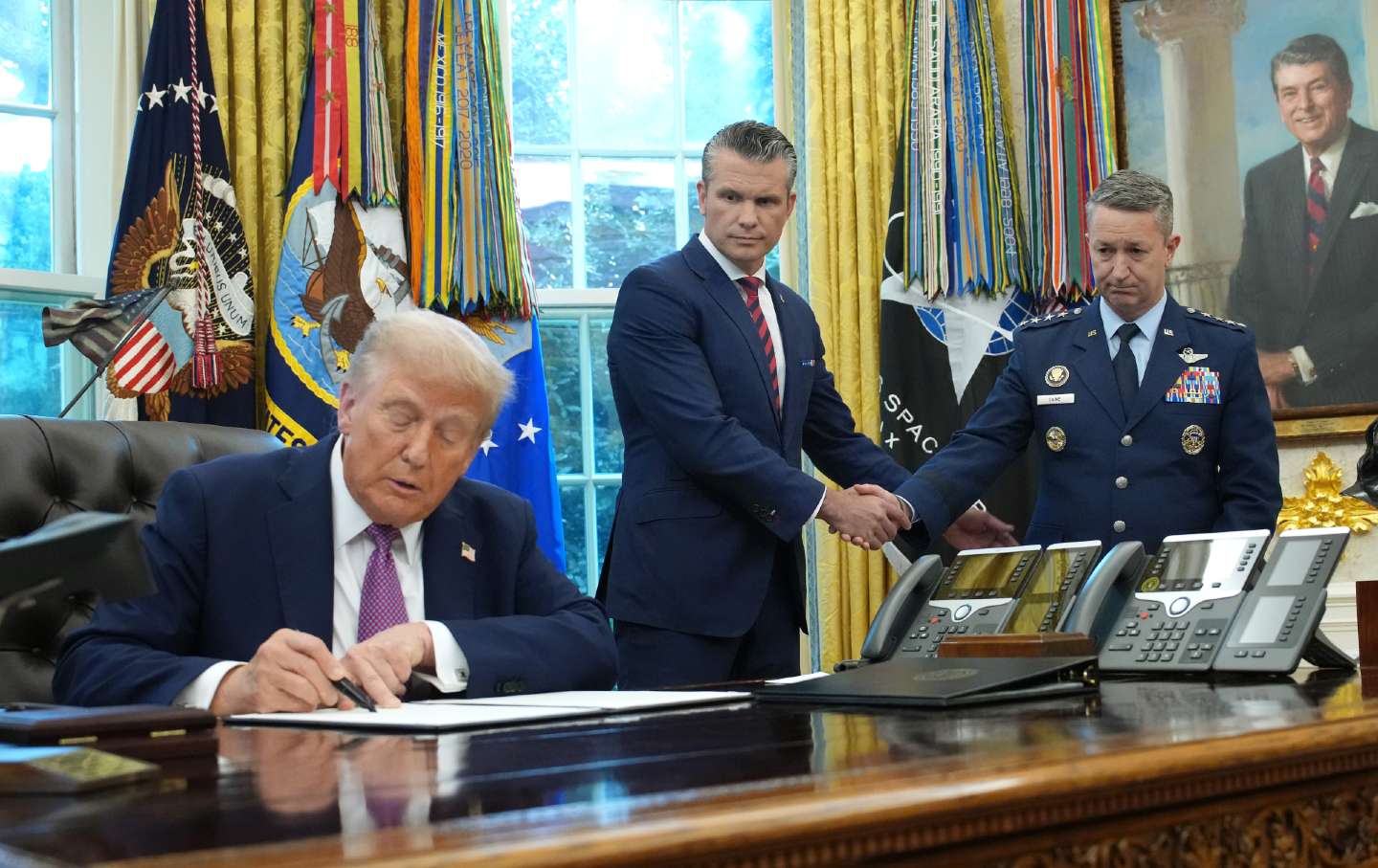Feature
/
September 9, 2025
The labor minister hopes to keep Spain’s far right at bay, while winning workers more free time. Will she pull it off?

Yolanda Díaz
(Jesús Hellín / Europa Press via AP)
The phrase Yolanda Díaz Pérez uses more than any other is “cambiar la vida de la gente” (change the lives of the people). I was speaking with the labor minister and second deputy prime minister of Spain on Zoom this spring, after my first encounter with her last November. A few days after Donald Trump’s reelection, Díaz had convened an International Labor Congress in Madrid. Bringing together labor ministers, union officials, researchers, and activists from around the world, she called for “an international alliance for labor rights.” All through the conference, Díaz, dressed in white, listened carefully and took notes from her seat at the front of the room.
Díaz ascended to high office during a time of successive crises—globally, domestically, and within Spain’s fractious left. She grew up in a shipping town in Galicia, on Spain’s Atlantic coast, an area with a history of union militancy, and has moved through various left-leaning coalitions in her rise from local politics—starting as the deputy mayor of Fene, her hometown—to the very center of national power. While all around her, European social democratic parties collapse, Díaz has maintained a reputation for pragmatism and deal-making. Amid polarization and infighting, she has brought real improvements to the Spanish people.
Today, she is the leader of the junior party in Spain’s coalition government. Our conversation took place before a fresh round of scandals within the senior party—the Partido Socialista Obrero Español (PSOE)—would once again call into question the stability of the coalition in July. Spain’s prime minister, Pedro Sánchez, has been the face of that government throughout its highs—resisting Trump’s pressure to hike military spending alongside the rest of NATO; speaking out against Israel’s genocidal assault on Gaza—and its lows: the revelations of corruption within his party and the calls for his resignation, mostly from his right-wing rivals.
Díaz, meanwhile, has led the charge on economic policy through two consecutive coalitions with the PSOE. She has pushed for labor policies that have improved wages and conditions for Spain’s lowest-paid workers and broadened collective bargaining, and watched the Spanish economy prosper as a result. Rising from the wreckage of Podemos, the left coalition of the post-financial-crisis years, she has helped hold off the rise of the far right in Spain, and has been touted as the country’s potential first female prime minister, but she has also struggled to give her new left party, Sumar—often translated as “Unite”—a coherent identity of its own. Launched in 2023 for the national elections in Spain, the party brought together more than a dozen progressive and leftist groups under its electoral banner, with Díaz at the head as its candidate for prime minister.
But Spain, unlike many other Western countries, was an authoritarian dictatorship for decades: Francisco Franco was still in power when Díaz was born, and her father was imprisoned for union activism during Franco’s reign. That’s helped to keep the far right politically toxic, but the nationalist, anti-immigrant, anti-feminist Vox party has made gains in recent years. (One of its campaign posters famously depicted a hand tossing symbols of gender equity and LGBTQ rights into a garbage can.) Vox has also played a central role in what Díaz has called “the International of Hate,” hosting a gathering shortly before the European elections that included France’s Marine Le Pen, Argentine President Javier Milei, and Israeli Likud minister Amichai Chikli, and video visits from Italian Prime Minister Giorgia Meloni and Hungarian Prime Minister Viktor Orbán.
Now Díaz faces her biggest challenge yet: to pass a law that would reduce the country’s workweek from 40 to 37.5 hours. It will be a test case of whether she can sustain a political organization that relies on more than her personal charisma—and of whether the European left can succeed based on a model of change like hers.

Current Issue

The mainstream press loves to point out that Díaz is a longtime member of the Communist Party, as her father was before her. (While she often says that she keeps the membership in tribute to her father, she also wrote the foreword to a new Spanish edition of The Communist Manifesto in 2021.) But Díaz was a labor lawyer before she entered politics, which trained her well for sitting at bargaining tables with employers and workers and hammering out deals. (She also had a habit of showing up to meetings with her baby in her arms.) Perhaps because of that training, Díaz’s ideological commitments have led to actual successes.
“They told us that raising the minimum wage was going to sink the economy,” she says. “Well, The Economist recognizes that this is not the case and that we also have the largest number of employed men and women in the history of Spanish democracy.” And, she notes, the numbers back her up—as do commentators who are not usually in the business of praising communists. The Economist, she points out, ranked Spain the best-performing economy in the world in 2024, with a 3.2 percent increase in GDP—the country was responsible for 40 percent of the eurozone’s growth last year—and had its lowest unemployment rate since 2007, before the financial crisis.
The shorter workweek, Díaz says, would be a way to redistribute the gains of productivity. “From the ’90s to today, productivity has increased by 53 percent and the wages of male workers and female workers only 22 percent,” she says. “What we want is to spread productivity at a time when the profit margins of companies are tremendous.”
Around the world, the project of shortening the workweek has brought together unions like the United Auto Workers and academic researchers like Joan Sanchis, an associate professor of applied economics at the Universitat de València and the author of Quatre dies: Treballar menys per viure en un món millor (Four-Day Week: Working Less to Live in a Better World). It has revived a tradition of fighting for shorter hours that stretches back hundreds of years, through the Haymarket Riots and Eleanor Marx’s labor activism, but dropped off after World War II. The four-day week was part of the Labour Party’s platform under Jeremy Corbyn, and Bernie Sanders has backed it, writing in 2024, “At a moment in history when artificial intelligence and robotics will radically transform our economy, it is time to make sure that working people benefit from this increased productivity, not just corporate CEOs and the billionaire class.… It’s time for a 32-hour workweek with no loss in pay.”
But it was not, Sanchis says, a policy that Díaz took to at first. The kind of union family she came from, he says, predisposed her to an outlook that saw a job as something that deserved respect, rather than something from which workers might want to be liberated. But as the policy drew more attention within Podemos, Díaz reconsidered it, and by 2020 she was speaking in favor of work-time reduction. The shorter workweek was part of the platform when Sumar launched in 2023, and a small reduction of two and a half hours a week—half an hour a day—was part of the agreement when Díaz formed the current coalition government with the PSOE.
“It is true that useful politics is not about differentiating the material conditions of life from the symbolic,” Díaz says. “Everything is important. The project that we are carrying out now in my country to reduce the working time, that I share with Bernie Sanders—it is a political proposal to improve people’s lives, but it is also a political proposal to advance freedom. That is to say it is also symbolic. The material and the symbolic are absolutely complementary in public policies.”

Chema Martínez is the general secretary of the service sector in the Comisiones Obreras (CCOO), or Workers’ Commissions, Spain’s largest trade union federation, which represents, he says, some 70 percent of Spanish service-sector workers. He sees the policy as one “with a long tradition” on the left and “in the trade unions, in which we think that it is possible to reduce the working day quantitatively without losing productivity.” Legally, he explains, the workweek in Spain is 40 hours, and many sectors already work fewer. But for some—especially in services—the hours are quite long. Indeed, the main opposition to the bill comes from small and medium-size companies, Sanchis says, particularly in tourism and hospitality.
But against that kind of opposition, Martínez has seen firsthand how Díaz’s labor reforms have transformed lives. Spain’s labor crisis in the 1970s and ’80s resulted in high unemployment and high inflation, and governments since that time have used precarious, temporary labor contracts to get young people into work with fewer rights and protections. According to Martínez, until the coalition government changed the law in 2021, almost a third of all workers’ contracts were part-time, and those workers would be the first to get fired when the economic winds changed. With Díaz’s reforms, he says, that number has fallen below 10 percent in the private sector, at the same time that employment has grown across the country. “All this is causing the inequality gap to narrow,” Martínez says.
The Spanish success story is notable compared to what has happened in Italy under the “post-fascist” Giorgia Meloni, where, according to Paolo Gerbaudo, a senior researcher on the Faculty of Political Science and Sociology at the Universidad Complutense de Madrid, most stimulus funds went to companies, which in turn used them for share buybacks and bonuses. Italy’s growth has been slow, while Spain’s investments in high-speed rail and renewable energy, along with those labor policies, brought its economy to the top of The Economist’s charts, surpassing the eurozone’s supposed powerhouses, France and Germany.
While it’s not directly under her purview, Díaz also played a role in the Spanish government’s success at mitigating inflation, while the rest of Europe and the US struggled. After the government capped the prices of essential goods and imposed a (temporary) tax on wealth over €3 million, Díaz stepped into the fray, pushing for big supermarkets to offer an affordable basket of goods to consumers. The economist Isabella Weber has noted that the Spanish government also moved “to monitor corporate profits and introduced windfall profit taxes on energy companies and banks.” Those policies, she wrote, not only brought inflation down in Spain before the rest of the eurozone; they also helped the coalition government stave off the right, with Vox losing 19 of its 52 seats in Congress. To Díaz, all this serves to disprove the neoliberal thesis that lowering standards for workers is the only way to spur investment.
“It is not an improvement for just our country,” she says. “It is an example for the whole world.”

With all of these successes, it’s almost a surprise that the government is not more popular. But scandals have rocked the PSOE, and battles within the left, and between the parties of the coalition, have eroded some of those high approval ratings. In 2021, Díaz was the most popular politician in the country, but Sumar struggled at last summer’s European elections, winning only three seats. In response to those results, Díaz stepped back from her position as coordinator of Sumar, though she maintained her post in government.
“With the radical left in Europe, we often end up in this position where they cannot form a government except with the center-left, while the center-left has other options,” Gerbaudo points out. The center-left parties tend to toss marginal parties a bone or two—for instance, leadership roles in ministries that it doesn’t consider terribly powerful. Díaz’s tenure at the labor ministry is different in this respect: She has actual power, and she’s used it. And her hope is that Sumar will build on her successes and put more people like her in office. It is not enough, Díaz emphasizes, to be a “dam of containment to the extreme right.” She wants Sumar to become part of an international movement by offering policy examples of what a state can do on behalf of its people rather than “a few minor oligarchs.”
Though Díaz did declare herself a candidate for the top job in the last election, Gerbaudo believes that most people—including Sánchez—still seemed to assume that she was running to remain the junior partner in a coalition. That perception both benefited her—the PSOE focused its fire on the right rather than on its left—and likely hurt her, or at least Sumar, which was seen in the press more as a vehicle for corralling a fractious left than a party truly contending for power.
Díaz, Sanchis says, was able to bring together a coalition in part because she maintained good relationships with smaller regional left parties across the country. But she was also trying to build a new left institution after the crack-up of Podemos in 2019. What remained of Podemos agreed to join the Sumar alliance in the last elections—a bit of a flip, as Díaz had represented the smaller faction within the Unidos Podemos slate in the previous government—but then almost immediately broke away once the government was formed.
While the PSOE held on and Sumar managed to remain the junior partner in the coalition, its margin has been too slender to do much. Meanwhile, the courts—which, Gerbaudo notes, are the most conservative wing of government in Spain, the one reformed the least after Franco’s death—have been fertile ground for “lawfare” against the PSOE and the prime minister. Several scandals, more or less confected, involve both Sánchez’s family and members of his party. Sumar had its own crisis when Íñigo Errejón—a cofounder of Podemos who left to start his own party, Más País, which joined the Sumar alliance—was accused of sexual assault. Díaz stripped him of his leadership role but was criticized for not acting sooner.
And so the PSOE-Sumar coalition continues, although Sánchez is facing calls for his resignation after an investigation in June found that the third-highest-ranking member of the PSOE was involved in taking kickbacks related to public works projects. Díaz called for a “reset” and for the government to return to its focus on passing legislation that helps working people, but the scandals leave her in a difficult position. Vox’s leaders are salivating at the chance to portray the left as corrupt; Sumar must find a way to distance itself from its coalition partners’ scandals while continuing to take credit for the government’s successes. If Sánchez falls, will he take Sumar with him?
As the debate over the workweek bill continues in parliament, Díaz has tried to get the smaller parties that support the coalition government on board. As Martínez of the service workers’ union explains, right-wing nationalist parties are part of the coalition, but because of their ties to business in the Catalan and Basque regions, they have resisted the policy. Díaz’s previous reforms helped her bring employers to the table, but the shorter workweek proposal has been put forward without significant support from business. According to Sanchis, proposals for subsidies or tax breaks for smaller businesses are being discussed in order to help get more of them on board, as Díaz once again tries to reach a compromise.
The idea of reducing working hours has broad popularity in Spain, Sanchis notes. He estimates that around 12 million people would benefit from the reform, and even the right-wing parties are hesitant to oppose it outright: “Public opinion polls, you take a look at them, 80 percent or more people are in favor of this measure.” Even the Popular Party’s leader has made rhetorical gestures toward a four-day workweek, though in a way that pits that policy against Díaz’s proposal.
Popular
“swipe left below to view more authors”Swipe →
“Both the Socialist party and Sumar know that they have to work hard on this work-time reduction proposal, because if it fails, it will be the final signal that the government is scrambling,” Sanchis says.
If that happens, the far right—in Spain, represented by Vox—is poised at the ready. It has not given up its quest for power, and there can be, even in Spain, an aura of inevitability about the rightward swing. “It is very striking,” Martínez says, “that the polls say the following: The majority of Spaniards want a progressive government, but they believe that it is not possible. That the ultra-right is going to win, as is happening in the United States, as is happening in Italy.” The far right takes up a lot of space on social media, where it focuses, he says, on three arguments: Democracy is a corrupt system where politicians buy off the people with goodies; the public pension system is a pyramid scheme; and taxes are theft.
This is the tension for the left in office: fighting for every incremental reform in order to prove to voters that they will materially benefit, while attempting to offer up a broader vision that transcends parliamentary maneuvering, and working to define itself against both the center-left and the far right. Díaz’s career at this moment is both a useful model to aspire to and a possible cautionary tale.
On the second day of the International Labor Congress, Díaz took the stage once again to close the event and invited participants to join her there to sign a Global Charter of Labor Rights, a document that pledges support for an agenda in marked contrast to the one that Trump has unleashed. Dressed in white once again, Díaz spoke of her proposal for the shortened workweek—in terms of both its material effects and its symbolic dimensions.
“Let’s start by reclaiming time,” Díaz said. “Time is the raw material from which our lives are made, and there is no hope possible without time to set it in motion. That half-hour a day over the current workday is a small step full of hope. It’s time to think, to rest, to care, for leisure, for culture, to be more free.” An alliance between unions, workers, and “the democratic force of progressive organizations,” she said, “can move what seemed immovable.”
But that half-hour a day also remains remarkably contentious. At press time, a vote on the bill had been postponed for further negotiations with the pro-business parties in the coalition, who are seeking to water it down. Meanwhile, unions, including CCOO, have called for mobilization in support of the bill. The result of the eventual vote will have wide-reaching implications for the direction of Sumar and the Spanish left in general—not to mention for Díaz’s own standing in government. In the meantime, she’ll be doing what she’s done since she was a labor lawyer: sitting at a table and trying to make a deal.
Donald Trump wants us to accept the current state of affairs without making a scene. He wants us to believe that if we resist, he will harass us, sue us, and cut funding for those we care about; he may sic ICE, the FBI, or the National Guard on us.
We’re sorry to disappoint, but the fact is this: The Nation won’t back down to an authoritarian regime. Not now, not ever.
Day after day, week after week, we will continue to publish truly independent journalism that exposes the Trump administration for what it is and develops ways to gum up its machinery of repression.
We do this through exceptional coverage of war and peace, the labor movement, the climate emergency, reproductive justice, AI, corruption, crypto, and much more.
Our award-winning writers, including Elie Mystal, Mohammed Mhawish, Chris Lehmann, Joan Walsh, John Nichols, Jeet Heer, Kate Wagner, Kaveh Akbar, John Ganz, Zephyr Teachout, Viet Thanh Nguyen, Kali Holloway, Gregg Gonsalves, Amy Littlefield, Michael T. Klare, and Dave Zirin, instigate ideas and fuel progressive movements across the country.
With no corporate interests or billionaire owners behind us, we need your help to fund this journalism. The most powerful way you can contribute is with a recurring donation that lets us know you’re behind us for the long fight ahead.
We need to add 100 new sustaining donors to The Nation this September. If you step up with a monthly contribution of $10 or more, you’ll receive a one-of-a-kind Nation pin to recognize your invaluable support for the free press.
Will you donate today?
Onward,
Katrina vanden Heuvel
Editor and Publisher, The Nation
More from The Nation

A new book on the Biden’s wars serves as a stark reminder that the Democrats need to formulate a new foreign policy—as well as reckon with the one they had.
Books & the Arts
/
Matthew Duss

The tech lord’s recent bid to reshuffle the ownership structure of his empire reinforces the clout of the Middle Eastern strongman regimes in its orbit.
Feature
/
Jacob Silverman

As Israel intensified its genocide in Gaza, Germany ramped up its long-simmering war on dissent, silencing Palestine solidarity while bolstering its own far right.
Feature
/
Nikki Columbus

Yes, we should welcome the latecomers to the fight against genocide, but there also needs to be accountability.
Column
/
David Klion

The ruler of a dying empire inflicts mindless militarism on Venezuela and Chicago.
Jeet Heer


